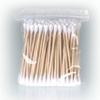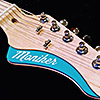j_flanders

Joined: Jun 28, 2017
Posts: 162
|

Posted on Jun 03 2018 06:23 PM
ausf wrote:
I had a Yamaha 12 volt power supply I planned on using, but while checking polarity, I found it was pumping out 15+ volts instead of 12
That points to an unregulated power supply. These only supply the 'correct' voltage if you plug them into a device that draws the 'correct' amount of current. Your multimeter does not, so it shows 15V instead of 12V.
Usually these power supplies belong to one specific device for which it was made. It's not a good idea to use it as a general PSU.
A regulated power supply will supply the same voltage regardless of the current drawn. If you draw more current than it can supply it will heat up and maybe burn through unless it has thermal shutdown protection.
According to the specs SB draws 1000mA and ST 5mA. I think Björn has said before that 500mA could work.
Nothing needs to warm up (there are no tubes in there).
A capacitor needs to charge up but that will never take 2 minutes.
The only other thing that in a rare case could need to heat up is a fautly solder joint or a crack in the pcb or one of its traces.
It's definitely not normal what you're experiencing. I've not seen anyone report this kind of behaviour for the SB.
Last edited: Jun 03, 2018 18:25:53
|
ausf

Joined: Apr 20, 2018
Posts: 47
|

Posted on Jun 03 2018 07:06 PM
Thanks for that. It might just be the power supply, both times it was plugged in right as it was being used (the supply I mean).
Today, without anything being moved or unplugged, it's worked perfectly and immediately.
If the SB draws 1 A, even if it might work on 500mA, if my power is topping out at .5A with the Trem and LED also feeds from it, maybe that's all and the supply itself needs to get going.
I've ordered a 1A regulated supply, I'll take it from there.
|
sublime40oz

Joined: May 29, 2018
Posts: 16
|

Posted on Jun 05 2018 07:41 AM
Has anyone used a hammond enclosure as a chassis for the surfy bear? Im looking at doing a budget build in some sort of wood box / cabinet, but want to make sure things are properly shielded. Does the actual reverb pan require shielding or can it be just bolted to the bottom of a wood cabinet if the surfy bear board is in a metal enclosure?
|
Mischa

Joined: Aug 29, 2017
Posts: 35
|

Posted on Jun 05 2018 07:59 AM
Hi Sublime, I have build two Surfy Bears in Hammond enclosures and they work fine. However, regarding shielding it is the pan that might pick up interference if it is too close to an amp or other electronics that send out radiation. This is the reason why you find most reverb pans screwed in the bottom of amps or as far away as possible from the chassis. But I would not worry too much if the pan is close to the Surfy Bear itself. I only would keep it away a bit from power adapters/supplies and amps.
|
sublime40oz

Joined: May 29, 2018
Posts: 16
|

Posted on Jun 05 2018 08:05 AM
Mischa wrote:
Hi Sublime, I have build two Surfy Bears in Hammond enclosures and they work fine. However, regarding shielding it is the pan that might pick up interference if it is too close to an amp or other electronics that send out radiation. This is the reason why you find most reverb pans screwed in the bottom of amps or as far away as possible from the chassis. But I would not worry too much if the pan is close to the Surfy Bear itself. I only would keep it away a bit from power adapters/supplies and amps.
Awesome, thanks for the info! Which size enclosure did you use?
|
Hurricane

Joined: Jun 02, 2018
Posts: 3
|

Posted on Jun 05 2018 08:12 AM
j_flanders wrote:
I guess it could work if you put the CLR+LED after the power connection to the pcb instead of before. Just switch the power (on/off) to the pcb and go to the CLR+LED after that.
Thanks a lot j_flanders and Gilette, you mean like this?

Generally this kind of switching is never used for true bypass because it will give you cracks and pops when you switch the effect on and off and also because there will be a (short) delay between turning the effect on, and hearing the effect because some big capacitors will need some time to charge up.
I thought the 3pdt was the solution to avoid the crack and pops when turning the effect off :-O
|
Mischa

Joined: Aug 29, 2017
Posts: 35
|

Posted on Jun 05 2018 08:15 AM
You’re welcome. For my first build I’m not sure but I think I used a 125B and for the second - which is a combo with the Surfy trem - I used a 1590TRPC. I posted pics not long ago somewhere in these pages. Both were tight fits but doable.
|
j_flanders

Joined: Jun 28, 2017
Posts: 162
|

Posted on Jun 05 2018 08:21 AM
I used 1590bb as it's easy to find, practical and not too expensive.
I used the sheet metal casing of an old broken VCR (which I folded in a rectangular 'box') to house two reverb pans: a short 3 spring (type 8 ) and a long 2 spring (type 4). I switch between them with a 4PDT switch.
Last edited: Jun 05, 2018 08:23:54
|
j_flanders

Joined: Jun 28, 2017
Posts: 162
|

Posted on Jun 05 2018 08:38 AM
Yes, Hurricane, that's exactly how I meant it. This will work.
3PDT is used to have true bypass switching (input and output) and switching the led on/off (while keeping the device powered on).
Pops are, unless mechanical/arcing, the result of a potential difference caused by slightly leaking capacitors.
The way to prevent it is to provide a 'drain path' to ground. This is done with a 'pull down' resistor before the first DC blocking capacitor in the circuit.
A good explanation can be found here: http://www.muzique.com/news/pulldown-resistors/
I have no idea why the 1M resistor in the SB schematic is after the cap instead of before. It must be serving another purpose than a pull down resistor (namely a filter) or is in the wrong place (which I doubt, although the schematic had several other errors as well...) Hmmm, dunno 
Last edited: Jun 05, 2018 08:39:23
|
Gilette

Joined: May 04, 2014
Posts: 734



|

Posted on Jun 05 2018 08:39 AM
Hurricane wrote:
j_flanders wrote:
I guess it could work if you put the CLR+LED after the power connection to the pcb instead of before. Just switch the power (on/off) to the pcb and go to the CLR+LED after that.
Thanks a lot j_flanders and Gilette, you mean like this?
I thought the 3pdt was the solution to avoid the crack and pops when turning the effect off :-O
That's better already. However like Flanders said, the sudden spike of switching the unit on just when you hit the switch might give some loud pops. Just try it and see if you like it, but it's a most unusual solution.
|
Hurricane

Joined: Jun 02, 2018
Posts: 3
|

Posted on Jun 05 2018 09:27 AM
j_flanders wrote:
Yes, Hurricane, that's exactly how I meant it. This will work.
3PDT is used to have true bypass switching (input and output) and switching the led on/off (while keeping the device powered on).
Pops are, unless mechanical/arcing, the result of a potential difference caused by slightly leaking capacitors.
The way to prevent it is to provide a 'drain path' to ground. This is done with a 'pull down' resistor before the first DC blocking capacitor in the circuit.
A good explanation can be found here: http://www.muzique.com/news/pulldown-resistors/
i´m gonna check it and test it. If i see i can't avoid the pops, i´ll change the plan and keep the reverb on instead of switching it off, like everybody does.
I have no idea why the 1M resistor in the SB schematic is after the cap instead of before. It must be serving another purpose than a pull down resistor (namely a filter) or is in the wrong place
it seemed illogical to me too, but i read some pages ago that it didn't matter if it was before or after? I guess i misunderstood it, I´ll try to find it to quote it.
This looks more logical:

(which I doubt, although the schematic had several other errors as well...) Hmmm, dunno 
 i thought the rest was fine, but as its my first attempt, i guess it isn't, can you appoint any other error? Thanks a lot! i thought the rest was fine, but as its my first attempt, i guess it isn't, can you appoint any other error? Thanks a lot!
|
j_flanders

Joined: Jun 28, 2017
Posts: 162
|

Posted on Jun 05 2018 09:48 AM
Hurricane wrote:
 i thought the rest was fine, but as its my first attempt, i guess it isn't, can you appoint any other error? Thanks a lot! i thought the rest was fine, but as its my first attempt, i guess it isn't, can you appoint any other error? Thanks a lot!
I was talking about the Surfy Bear schematic, not your switching schematic. 
|
sublime40oz

Joined: May 29, 2018
Posts: 16
|

Posted on Jun 05 2018 09:58 AM
Thanks everyone. Are there any more affordable options out there for a wooden cab than mojotone?
|
futilitarian

Joined: May 28, 2018
Posts: 11

|

Posted on Jun 05 2018 01:27 PM
sublime40oz wrote:
Has anyone used a hammond enclosure as a chassis for the surfy bear? Im looking at doing a budget build in some sort of wood box / cabinet, but want to make sure things are properly shielded. Does the actual reverb pan require shielding or can it be just bolted to the bottom of a wood cabinet if the surfy bear board is in a metal enclosure?
I used the hammond 1456RH3BKBU. It's 17 x 8.3 x 3. The tank and everything fits in nice and snugly. I don't have a photo of just the tank attached to the blue bottom.


|
ausf

Joined: Apr 20, 2018
Posts: 47
|

Posted on Jun 05 2018 02:16 PM
Just want to thank j flanders, you were exactly on point.
Björn suggested a resolder prior to replacing and it was all I needed to get this puppy working like a charm. I went over them all and as soon as I plugged it in after had immediately beautiful drippiness.
I used silver solder, liquid flux, pre tinned everything and a Hakko station on the the highest setting, but I guess one somewhere got past me. They all 'looked' good on the board, bright, solid and consistent, had a questionable one on the mixer pot, if that was the cause. The joint was solid, but some of the wire insulation looks like it dripped into it, maybe it had some encased.
Either way, problem solved. I assembled the case then wired, probably should have had them out on the bench and clear.
|
Ariel

Joined: Aug 29, 2009
Posts: 1556
Israel






|

Posted on Jun 05 2018 02:19 PM
sublime40oz wrote:
Has anyone used a hammond enclosure as a chassis for the surfy bear?
Only for the circuit board(s). The bigger metal boxes are expensive, and not necessary IMO. Cool if you score one, tho.
Im looking at doing a budget build in some sort of wood box / cabinet, but want to make sure things are properly shielded.
Good! Many people here have succeeded with tool boxes, built their own custom enclosures... be creative, use what's around you, anything will do. A local carpenter or hobbyist is also an option, but DIY man, it's satisfying.
Does the actual reverb pan require shielding or can it be just bolted to the bottom of a wood cabinet if the surfy bear board is in a metal enclosure?
Yes is can. Mounting it on springs (or foam, or rubber, or...) is preferable, to add an extra layer of suspension. No extra shielding needed, unless it's close to a power transformer or line. A simple 'bag' like used in amps can be a solution, but most likely you won't have a problem to begin with.
futilitarian, that's a very nice build, plenty room for another Surfy B!
About those pops, clicks and stuff: It's not really an issue, though one should think it would be with this high current. has anyone actually witnessed them, or it is all just in theory? In any configuration I tried, I never had any issue (with a STRONG amp). If there's a better way to wire the bypass, none can object, but in my limited experience using either the PCB's own connections, or an external 3PDT, the result was always clean and fast switching, with or w/o LED; before or after resistor, I tried it all.
Last edited: Jun 05, 2018 15:02:27
|
Elrondo

Joined: Jun 03, 2018
Posts: 22
Bavaria

|

Posted on Jun 05 2018 02:41 PM
sublime40oz wrote:
Thanks everyone. Are there any more affordable options out there for a wooden cab than mojotone?
Hiya
I'm also looking for an enclosure at time.
For a cheap wooden cab try to search for wooden wine present boxes on Exxy.
I found a pretty solid one with slotted corners. It was for "Magnum" bottles.
20€ incl. shipping. Wich is close to 20$ US.

Last edited: Jun 05, 2018 15:05:49
|
Led_Zebra

Joined: Jun 01, 2018
Posts: 3
|

Posted on Jun 09 2018 12:59 PM
Please help!
i need some chassis/hardware help. i've got the surfy bear and the red 17 inch tool box from harbor freight. i do not like the mounting screw included with the kit.
what size screw can i substitute? do you guys use risers? how do i get some tiny space between the circuit board and the tool box? what size washer? do you use a lock washer? what size drill bits are used/common for this kit?
any hardware help would be great!
i hope to have it look like this.

Last edited: Jun 09, 2018 12:59:42
|
Mischa

Joined: Aug 29, 2017
Posts: 35
|

Posted on Jun 09 2018 01:23 PM
Hi Led Zebra, I do not know if you are aware that it is recommended to mount the chassis against a metal base. The base can act as a heat sink for the JFets. They are supposed to become very hot. If you place a washer between the chassis and case I would recommend to be sure that you cover all the JFets (and keep the tape in place). I think the choice of screw does not matter, you can use any that fits, it is only to make sure the chassis is mounted properly.
|
Elrondo

Joined: Jun 03, 2018
Posts: 22
Bavaria

|

Posted on Jun 09 2018 01:24 PM
Led_Zebra wrote:
Please help!
i need some chassis/hardware help. i've got the surfy bear and the red 17 inch tool box from harbor freight. i do not like the mounting screw included with the kit.
what size screw can i substitute? do you guys use risers? how do i get some tiny space between the circuit board and the tool box? what size washer? do you use a lock washer? what size drill bits are used/common for this kit?
any hardware help would be great!
i hope to have it look like this.

Hi,
You need to screw the back side directly to the metal housing for cooling down the transistors.
Do no forget to add the included cooling tape to the back of the transistors before mounting the board. This prevents the transistors from getting electric contact with the housing and the cooling paste helps to ensure a good heating flow to the metal.
Due the hight of the transistors you will automatically get some space under the circuit board. I did this myself today.
My Kit arrived yesterday. I used a 3mm diameter screw. The hole in the board is 3.2 mm.
Hope that helps a bit.
Greets and a nice weekend.
Last edited: Jun 09, 2018 13:40:54
|








 i thought the rest was fine, but as its my first attempt, i guess it isn't, can you appoint any other error? Thanks a lot!
i thought the rest was fine, but as its my first attempt, i guess it isn't, can you appoint any other error? Thanks a lot!





























